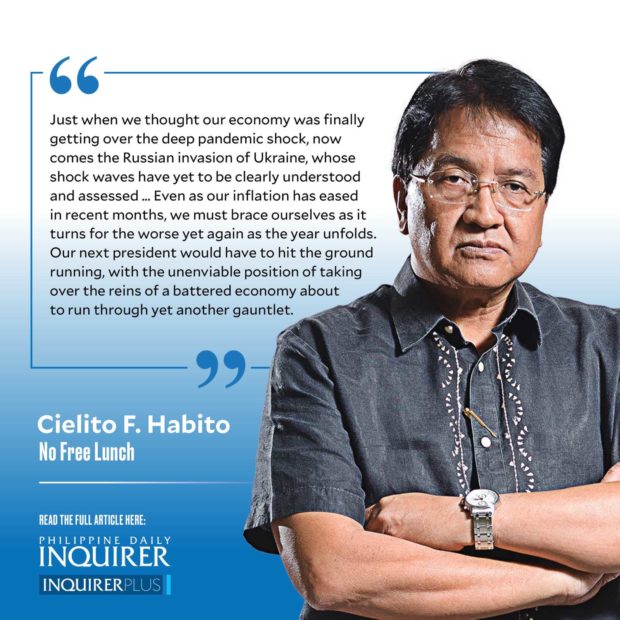The Russia-Ukraine fallout
Just when we thought our economy was finally getting over the deep pandemic shock, now comes the Russian invasion of Ukraine, whose shock waves have yet to be clearly understood and assessed. Our direct economic linkages with both countries are actually minimal, but the impact of the conflict’s global repercussions is likely to be the greater threat to our economy and our people. Added to already elevated oil and commodity prices worldwide and financial pressures stemming from high levels of global debt especially in the United States, the ride coming out of the pandemic crisis promises to be anything but smooth. And for small economies like ours, the ride could be even rougher.
How would we be directly impacted by the Russia-Ukraine conflict? Based on our official foreign trade statistics, our exports to Russia were a relatively minimal $102.3 million in 2019, or a mere 0.1 percent of our total exports, mostly in the form of office machine parts, electrical transformers, and integrated circuits. But our imports from them were nearly ten times as much in value, at $985.8 million or 0.9 percent of total imports, mostly semi-finished iron, petroleum, and wheat. To Ukraine, we exported a miniscule $4.8 million worth of products, mostly integrated circuits, scrap plastic, and processed fruits and nuts. But we imported 57 times as much from them, amounting to $272.4 million or 0.2 percent of our total imports, mostly wheat, semi-finished iron, and sawn wood. Ukraine was actually the fourth largest source of our total cereal imports in 2020, and the third largest for wheat, while Russia supplies about a sixth of our oil imports.
There is hardly any trade in services between the Philippines and these two countries. Our recorded foreign direct investments from them are likewise negligible ($110,000 from Russia and $10,000 from Ukraine in 2019). Last year, remittances amounted to $2.3 million from Russia and $121,000 from Ukraine, with just over 350 Filipinos known to be residing in the latter (and now being evacuated), according to the Department of Foreign Affairs. All told, direct impacts of the invasion owing to disruption of trade, investment, and remittances would appear minimal.
However, it is actually the indirect impacts of the Russia-Ukraine conflict, and Western moves in response to it, that could well pose the bigger problem for us through their repercussions on the global economy and markets. With Russia and Ukraine together producing about a quarter of the world’s wheat, this is one commodity whose global flows and prices will be affected by the war-induced disruption of supplies from these two major producers. Thus, even though we might readily source from elsewhere the wheat imports lost from Ukraine suppliers, the likely spike in world wheat prices will raise the price of flour, hence bread and other baked goods. It will also push up the price of animal feeds where wheat is a major ingredient, which will in turn lead to higher meat prices. The world is in for elevated food prices over the following months, which for us had already been happening in the past year due to our own internal problems with steep declines in livestock and fisheries supplies.
On top of food, energy costs will rise further than they already have, with crude oil prices feared to go as high as $150 per barrel, especially if Russia’s large supplies of oil and gas are cut off from the market by Western sanctions. For a country like the Philippines that imports virtually all its fossil fuels, there will be major implications for electric power and transport costs. Still another vital commodity whose costs will further rise is nitrogen fertilizers, a by-product of petroleum refining, along with another key fertilizer component potash, of which Russia is a major source—in turn feeding further into surging food prices.
And so, even as our inflation has eased in recent months, we must brace ourselves as it turns for the worse yet again as the year unfolds. Our next president would have to hit the ground running, with the unenviable position of taking over the reins of a battered economy about to run through yet another gauntlet.





















